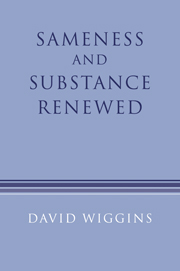Book contents
- Frontmatter
- Contents
- Preface
- Preamble, chiefly concerned with matters methodological and terminological
- 1 The absoluteness of sameness
- 2 Outline of a theory of individuation
- 3 Sortal concepts: and the characteristic activity or function or purpose of things falling under them
- 4 Individuative essentialism
- 5 Conceptualism and realism
- 6 Identity: absolute, determinate, and all or nothing, like no other relation but itself
- 7 Personal identity
- Select bibliography
- Index of names of persons cited or mentioned
- Index of contents (themes, theses, examples, etc)
3 - Sortal concepts: and the characteristic activity or function or purpose of things falling under them
Published online by Cambridge University Press: 05 June 2012
- Frontmatter
- Contents
- Preface
- Preamble, chiefly concerned with matters methodological and terminological
- 1 The absoluteness of sameness
- 2 Outline of a theory of individuation
- 3 Sortal concepts: and the characteristic activity or function or purpose of things falling under them
- 4 Individuative essentialism
- 5 Conceptualism and realism
- 6 Identity: absolute, determinate, and all or nothing, like no other relation but itself
- 7 Personal identity
- Select bibliography
- Index of names of persons cited or mentioned
- Index of contents (themes, theses, examples, etc)
Summary
The barley drink disintegrates and loses its nature unless it is constantly stirred.
(Heraclitus, Diels fragment 125.)Nothing is permanent in a substance except the law itself which determines the continuous succession of its states and accords within the individual substance with the laws of nature that govern the whole world.
(Leibniz, Gerhardt ii, 263.)That which is a whole and has a certain shape and form is one in a still higher degree; and especially if a thing is of this sort by nature, and not by force like things which are unified by glue or nails or by being tied together, i.e. if it has in itself the cause of its continuity.
(Aristotle, Metaphysics 1052a22–5, as translated by W. D. Ross.)THE SORTAL PREDICATES OF NATURAL KINDS
Among the best candidates to play the roles of sortal and substantial predicates, as these roles were described in Chapter Two, are natural kind words. We now reach the question whether even these will fill the bill. Given a kind k associated with the sortal concept c introduced by some sortal predicate or substantive, how can c determine what is at issue, what the matter turns on, when it is asserted or denied that x and y, which instantiate k, are one and the same? D(iii) as glossed by D(v) requires something to be latent or implicit within the sense of a natural kind identification that will determine, for x, for y, for typical other members of the kind, some further specifiable principle of activity.
Information
- Type
- Chapter
- Information
- Sameness and Substance Renewed , pp. 77 - 106Publisher: Cambridge University PressPrint publication year: 2001
